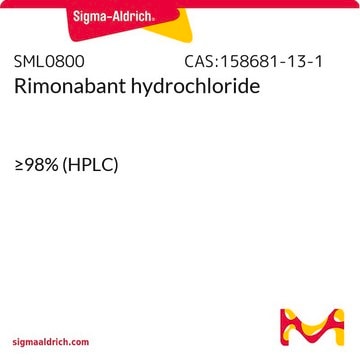A8973
2-Arachidonyl glycerol
~10 mg/mL, ≥98% (HPLC)
Sinónimos:
(all-Z)-5,8,11,14-Eicosatetraenoic acid 2-hydroxy-1-(hydroxymethyl)ethyl ester, 2-AG, 2-Arachidonoylglycerol, 2-Monoarachidonoylglycerol
About This Item
Productos recomendados
description
9:1 mixture of 2-AG and 1-AG
assay
≥98% (HPLC)
form
solution
drug control
regulated under CDSA - not available from Sigma-Aldrich Canada
concentration
~10 mg/mL
shipped in
wet ice
storage temp.
−20°C
SMILES string
[H]C(CO)(OC(CCC/C=C\C/C=C\C/C=C\C/C=C\CCCCC)=O)CO
InChI
1S/C23H38O4/c1-2-3-4-5-6-7-8-9-10-11-12-13-14-15-16-17-18-19-23(26)27-22(20-24)21-25/h6-7,9-10,12-13,15-16,22,24-25H,2-5,8,11,14,17-21H2,1H3/b7-6-,10-9-,13-12-,16-15-
InChI key
RCRCTBLIHCHWDZ-DOFZRALJSA-N
Gene Information
human ... FAAH(2166)
rat ... Cnr1(25248) , Cnr2(57302)
¿Está buscando productos similares? Visita Guía de comparación de productos
Biochem/physiol Actions
Caution
Physical form
signalword
Danger
Hazard Classifications
Acute Tox. 4 Dermal - Acute Tox. 4 Inhalation - Acute Tox. 4 Oral - Eye Irrit. 2 - Flam. Liq. 2
Storage Class
3 - Flammable liquids
wgk_germany
WGK 2
flash_point_f
35.6 °F - closed cup
flash_point_c
2 °C - closed cup
ppe
Eyeshields, Faceshields, Gloves, type ABEK (EN14387) respirator filter
Certificados de análisis (COA)
Busque Certificados de análisis (COA) introduciendo el número de lote del producto. Los números de lote se encuentran en la etiqueta del producto después de las palabras «Lot» o «Batch»
¿Ya tiene este producto?
Encuentre la documentación para los productos que ha comprado recientemente en la Biblioteca de documentos.
Los clientes también vieron
Contenido relacionado
ZipTip® micro-SPE pipette tips are used as a single-step desalting, concentration, and purification tool for complex samples before mass spec analyses.
ZipTip® micro-SPE pipette tips are used as a single-step desalting, concentration, and purification tool for complex samples before mass spec analyses.
ZipTip® micro-SPE pipette tips are used as a single-step desalting, concentration, and purification tool for complex samples before mass spec analyses.
ZipTip® micro-SPE pipette tips are used as a single-step desalting, concentration, and purification tool for complex samples before mass spec analyses.
Nuestro equipo de científicos tiene experiencia en todas las áreas de investigación: Ciencias de la vida, Ciencia de los materiales, Síntesis química, Cromatografía, Analítica y muchas otras.
Póngase en contacto con el Servicio técnico










